One on one meetings are a cornerstone to an effective manager <-> team member relationship, from small startups to giant companies.
What you talk about, and the one on one meeting questions you ask, make all the difference in the performance of your team.
It's why Andy Grove, the legendary founder of Intel and author of High Output Management, said this about one on ones:

Over the past several years, I've spoken to thousands of managers. Making the most of one on one meetings is one of the biggest differences between good, effective leaders, and bad, frustrating managers.
It's why the company I helped found, Lighthouse, is built to help you make the most of them.
So then: what should you talk about?
There are a variety of topics you can cover in your one on one meetings.
Most are things you would rarely, if ever, get a chance to talk about otherwise, but can have a huge impact on your team's morale and engagement.
Even better, because you're having them in a private setting with a decent amount of time (hopefully 60 minutes, but at least 30), you can dig into their responses and really explore their answers, ideas, frustrations, and feedback by asking good follow-up questions.
In the guide below we'll teach you all the one on one meeting questions you can should use to explore every one of the most important topics for these meetings.
Table of Contents
- One on one meeting questions great managers use for:
- Building rapport & trust
- Talking about career development
- Giving and receiving feedback
- Talking about ways to improve your team or your company
- Checking in on their general happiness
- Special questions for remote employees
- Leading your team through difficult times
- Being a coach to your team
- Skip level meeting questions
- The one on one meeting questions you need to ask every time
- Additional resources to help you
See a topic that interests you? Click on any of the links above to be sent straight to that section (there's also a link to go back to the table of contents at the end of each point).
And to read all the 1:1 questions go in order, read on.
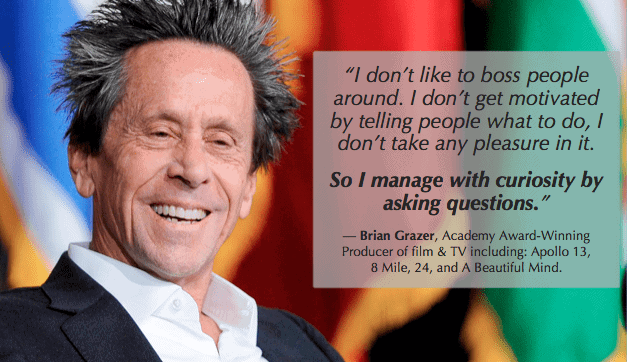
152 One on One Meeting Questions Great Managers Use to Create High Performing Teams
[Ed note: This post is also an answer on Quora. If you find this post and others on the Lighthouse blog helpful, please go here and upvote Jason Evanish's answer.]
For each of the key topics below, we've included a few different types of questions. Including:
- Questions that are best to ask to foster a great conversation now, and
- Questions you should ask every meeting to make sure you're having good, productive conversations going forward
Without each of these types of one on one meeting questions, you can lose momentum and your team may disengage from sharing or talking much in your one on one meetings. Mixing up your questions helps you cover all the most important topics, and keeps your meetings from getting stale.
Let's dive in.
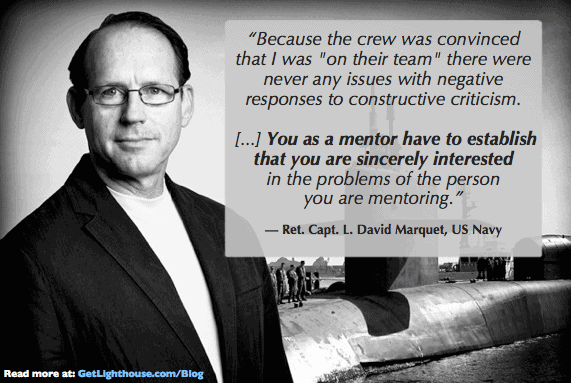
1) One on one meeting questions for Building Rapport & Trust
The foundation of any good manager and team member relationship is rapport. If your team doesn't feel like you care about them as an individual, they're unlikely to be motivated to work hard for you.
This chart from Gallup powerfully summarizes that fact:
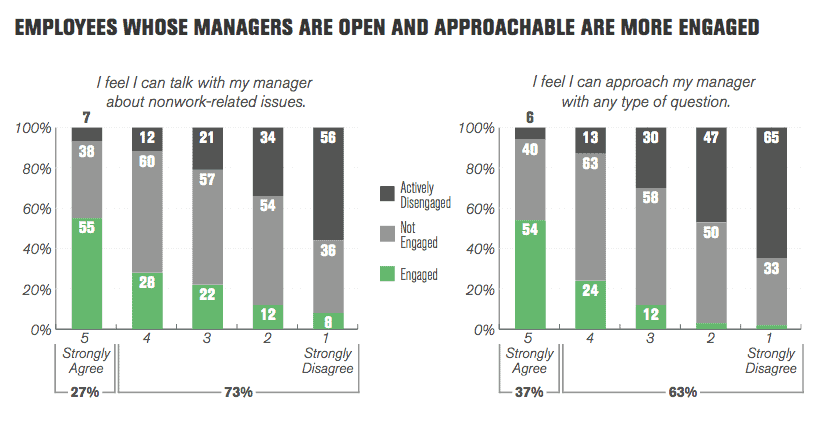
As you can see, if your team doesn't feel like you care about them and trust they can come to you, there's almost zero chance they'll be engaged at work.
Put more simply, Camille Fournier, former CTO of Rent the Runway and author of The Manager's Path, has learned:

So how do you create that trust?
Creating trust and building rapport (sometimes also called Psychological Safety) is easier than you may think. As Fournier suggests, all you need to do is take an interest in them as people.
By learning what's important to them, remembering what those things are when it counts, and working with them through personal challenges that occasionally affect work (divorce, children, sickness, family issues, injuries, etc) you build more and more trust, rapport, and loyalty.
The Emotional Savings Account
My father, who had an average tenure of 17 years with his accounting staff (industry average is ~3.5 years), called this rapport you build an, "Emotional Savings Account.”
When you do things to strengthen trust, or show you understand them, you're paying into the account. Then, when something difficult happens like a tough decision that affects them, no pay raises for a year, etc you withdraw from the account.
When the account is drained, you lose your good people, or they disengage.
Through the years, like any business, my father's company had its share of ups and downs. He retained good people because he did things to show he valued his staff individually from day 1 all the way to their rocking chair retirement gift and dinner (coincidentally, his leading cause of voluntary turnover).
What's the balance in your Emotional Savings Account with your team?
Okay, so what do you ask to Build Rapport and Trust?
The short answer is to be human! Find out what's important to them and what their interests are. Start by getting to know them and then revisit asking about the things they care about in future one on one meetings.
Here's a few one on one meeting questions to ask to get you started:
- 1) How are you? How is life outside of work?
- 2) How do you feel your work/life balance is right now?
- 3) What is your rhythm? (A great lesson from Marissa Mayer)
- 4) What's one thing we could change about work for you that would improve your personal life?
- 5) If around a holiday: Do you celebrate [Holiday]? How was it?
- 6) How are your parents/grandparents? Where do they live? Do you visit them?
- 7) If they have children: How is [name of child] doing? (Ask something related to their age like starting school, playing sports, or other interests.)
- 8) What do you like to do in your free time? What are your hobbies?
- 9) What did you do for fun in the past that you haven't had as much time for lately?
- 10) What drives you? What motivates you to come to work each day?
- 11) Where did you grow up? What's something you liked about the area?
- 12) Do you have any pets? How long have you had them?
Want more ideas? Not sure how to handle someone who is of a different generation, ethnicity, background, culture, or life stage? There are over 102 ideas for building rapport right here.

2) One on one meeting questions for Talking about Career Development
What do you think is the #1 perk people want at work according to multiple studies by respected sources like Gallup, Deloitte, and Google?
It's not free lunch, health insurance, a 401k, or ping pong tables.
It's career growth.
Below is just one example of the myriad of data showing how much people want to grow:
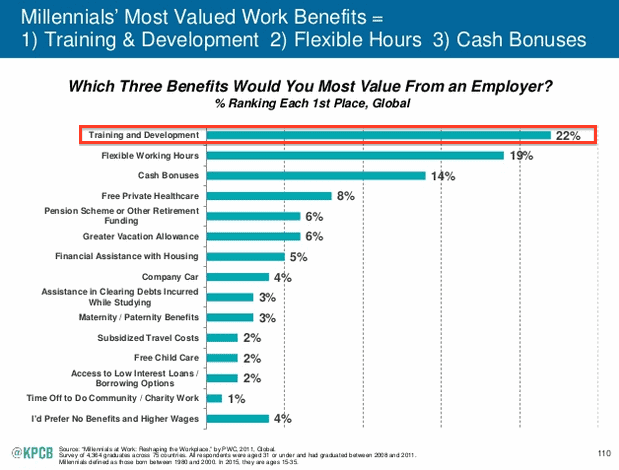
And when they inevitably look for another job, according to a study by PwC, growth is what people look for in their next job, too:
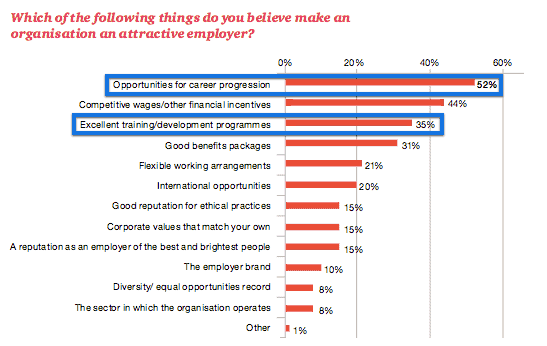
Your 1 on 1s are a great time to talk about their growth because, let's be honest, with everything going on, adding another meeting ad hoc to "talk about your career” falls into the "best intentions, but never happens” bucket.
Instead, every 3-4 one on one meetings, talk about their career development.
Start by establishing their goals.
At first, you need to establish what their goals and interests for growth are. These questions are a great place to start:
- 13) What work are you doing here that you feel is most in line with your long term goals?
- 14) As a kid, what did you want to be when you grew up?
- 15) What do you want to be doing in 5 years? 10 years? 3 years?
- 16) What are your long term goals? Have you thought about them?
- 17) Who do you really admire? Why? (People often admire those they want to become)
- 18) If you had millions of dollars, what would you do every day?
- 19) What are your superpowers? What powers would you like to develop?
- 20) What do you want to do in your next job?
- 21) Do you feel challenged at work? Are you learning new things?
- 22) What area of the company would you like to learn more about?
- 23) What skills would you like to develop right now?
- 24) Who in the company would you like to learn from? What do you want to learn?
- 25) What additional training or education would you like?
- 26) Are there any roles in the company you'd like to learn more about?
- 27) What do you think are the key skills for your role? How would you rate yourself for each of them?
When you ask these questions, some people on your team will know immediately what they want.
Maybe they want to start a company someday. Maybe they have a goal to be a CMO or CTO. Or, they could be narrowly focused on the next promotion in front of them like becoming a manager, senior associate, or Software Engineer III.
For those that don't know, you'll need to work more with them at this stage.
Questions 16-25 are all about uncovering them by first looking at what excites them about their work and what they're best at. People who get to work on their strengths are more engaged at work according to Gallup. Help your team and actually help them long-term as well by uncovering these.
Then, make progress together.
Talking about their goals is a good start, but it's not enough on its own. People need to feel progress on them.
You have to turn talk into action.
Taking action takes advantage of the Progress Principle that Ph.D.'s Teresa Amabile and Steven Kramer discovered is the key to sustained workplace happiness:

Here are some questions to ask to make sure you're making progress on their growth & development:
- 28) What's one thing we could do today to help you with your long term goals?
- 29) Do you feel we're helping you advance your career at a pace you would like? Why or why not?
- 30) What are your big dreams in life? Are you making progress on them?
- 31) Could you see yourself making progress on more of your goals here? What would need to change to do so?
- 32) What skills would you like to work on most right now?
- 33) Are there any events or training you'd like to attend to help you grow your skills?
- 34) Who in the company would you like to learn from? What do you want to learn?
- 35) Do you feel like you're making progress on your big goals here? Why or why not?
Sometimes you won't be able to make a lot of progress. Talking about why and setting the stage for what you can do in the future is a great way to keep them engaged anyways.
Want more help having career conversations with your team? Here are a few places to start:
- -> How to start a career conversation with a team member
- -> What to do if they don't know what their career goals are.
- -> How to grow your employees when your can't promote them.
- -> How to Find a Mentor at Work for Your Team Member

3) One on one meeting questions for Giving and Receiving Feedback
Given the privacy of a one on one, and the trust you're building with them in these meetings, it is an excellent time to discuss feedback.
This is true for both coaching them on an area they could improve, and getting feedback from them. Either way, you'll have the opportunity to be candid with each other privately.

With privacy, and the healthy time set aside in a one on one, you can dig into a piece of feedback so you're on the same page. This avoids the defensiveness and resistance that can come from public feedback.
Feedback helps everyone get better.
If you want to help them improve, the best place to start is with feedback for them. Here are some questions to start that discussion:
- 36) Do you feel you're getting enough feedback? Why/why not?
- 37) What's a recent situation you wish you handled differently? What would you change?
- 38) What's an area of your work you want to improve?
- 39) What aspect of your job would you like more help or coaching on?
- 40) How many hours a day do you feel you're productive? How could we help you be more productive?
- 41) How do you prefer to receive feedback?
As a manager, it's important to give your team feedback and coaching, and not just at review time. Research shows most people would like feedback more often:
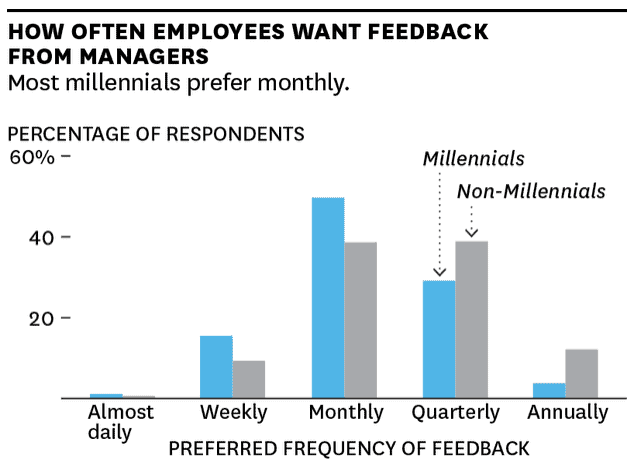
Asking questions like the ones above help you understand where they may be most receptive and interested in your feedback and coaching. Take advantage of this; they'll be particularly motivated to accept and work on feedback in those areas.
Of course, if they have other places you feel they need to improve you should share that with them as well.
The Pro Move: Tie feedback to their goals.
If you want to be a real pro, then that's where you should look to see how you can tie the feedback for them either partially to an area of interest they have (like attention to detail as part of them stating they wanted to improve presentation skills) or their career goals ("I need you to improve in this area for me to be ready to advocate for you to get that promotion.”)
If you're looking to get beyond the stereotypical sh*t sandwich for feedback (Light praise - real feedback - light praise), then try some of the 6 tactics here to help you give better feedback.
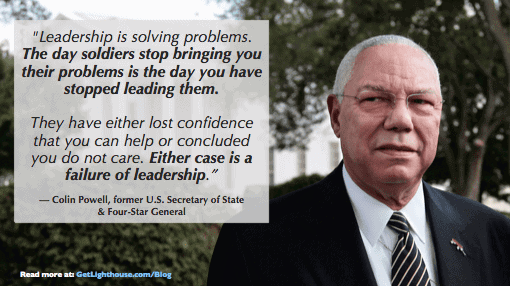
Remember to get feedback, too!
Feedback is a two-way street. If you want to improve as a manager (and who doesn't have more to learn and work on?), then listening to your team's feedback for you is big, too.
Again, the right one on one meeting questions can open up valuable insights for you to learn from:
- 42) What could I do as a manager to make your work easier?
- 43) What is something I could do better? What is a criticism you have for me?
- 44) What aspects of your work would you like more or less direction from me?
- 45) What would you like to know about me?
- 46) What could I do to make you enjoy your work more?
- 47) What do you like about my management style? What do you dislike?
- 48) Is there a situation you'd like my help with?
- 49) What have your past managers done that you'd like me to also do or not do?
- 50) What's your favorite thing I do as a manager I should keep doing?
- 51) How can I better support you?
When you get this feedback from your team member, be as open as you can. Ask clarifying questions about recent examples, or the reasoning why they chose that. Don't be defensive.
If you're open to feedback and show you take it to heart, or explain why things are a certain way, you build more trust with your team. That then creates a virtuous cycle where they're more likely to share more feedback, and come to you when you need them to.
Having trouble getting feedback from your team? You can get some ideas for getting more team feedback.
You can also read some of our other posts on feedback:
- Awesome Ways to Give Feedback to Your Team
- Learn the 3 Steps to Give Feedback: Use the Prepare-Listen-Act Model, and listen to our podcast episode on it.

4) One on one meeting questions for Improving Your Team or Your Company
The beauty of one on ones is their flexibility. You suddenly have this block of time on your calendar to talk about anything with your team member.
One of the surprisingly valuable ways is to talk about how to improve your team or the company; your team members often have priceless insights that can save you money and time, or improve things in ways you'd never realize on your own. You'd find out about them if only you took the time to ask!
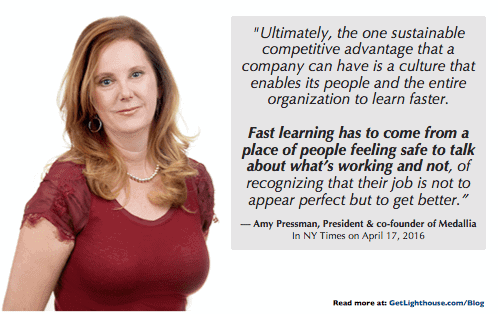
Remember: Everyone in your company has a different vantage point. They're often much closer to problems and opportunities with customers and other employees than you.
Here are some good questions to tap into exactly those kinds of insights:
One on One Meeting Questions About Your Company or Department:
- 52) What's one thing we'd be *crazy* not to do in the next quarter to improve our product?
- 53) If you were CEO, what's the first thing you'd change?
- 54) Do you think our company is loyal to its employees? Why or why not?
- 55) Are there any aspects of our culture you wish you could change?
- 56) What are your favorite parts about our culture?
- 57) Which company values do you like the most? Which the least? Why?
- 58) What is the #1 Problem at our company? Why?
- 59) How could we be more creative or innovative as a company?
- 60) How well do you feel like you relate to your coworkers? Do you view them as friends, acquaintances, or strangers?
- 61) What is the company not doing today that we should do to better compete in the market?
One on One Meeting Questions About Your Team:
- 62) What would convince you to leave for a job somewhere else?
- 63) Why do you think [employee who recently quit] left? What did they tell you?
- 64) Do you feel over-worked, under-worked, or just the right workload?
- 65) Do you feel like you're on the same page with the team? How often do you think you need meetings to ensure you stay that way?
- 66) Are there any meetings or discussions you feel you should be a part of that you're not? Are you included in any you don't want to be a part of?
- 67) Who would you like to work more often with? Why?
- 68) Is everyone pulling their weight on the team?
- 69) Who is kicking ass on the team? What have they done?
- 70) Who on the team do you have the most difficulty working with? Why?
- 71) What do you like most about working on our team?
- 72) Do you help other members of the team? Do others help you when you need it?
- 73) Are you uncomfortable giving any of your peer's constructive criticism? If so, why?
- 74) What's an inexpensive thing we could do to improve our office environment for the team?
- 75) How could we change our team meetings to be more effective?
Want to better keep track of what you talk about in your 1:1s, including the answers to these questions? Download our free 1:1 meeting template now to help you:

The benefit of these questions about improvement are two-fold:
1) Get burning issues off their chest
If there's something that's really bothering them, then this is a great way to make them feel heard on something important to them. They may have a specific answer to one of these questions, or suddenly realizing this is a safe subject, bring up something else on their own.
The key here is you want to avoid having anyone on your team feeling what psychologists call "learned helplessness." This is what happens when things that bother them feel beyond their control for too long. Disengagement and turnover follow at that point.
Fortunately, simply the act of talking about them and finding even the smallest thing you can do to address it can go a very long way to making them feel better. This is another way to apply the Progress Principle we discussed earlier.
2) Get your people thinking like owners
The best companies have all their employees thinking about improving the company. It's a major key to Toyota's Total Production System, where even the lowest-ranking factory line worker is listened to for feedback and ideas.
If you ask a question like the ones above and they don't have a ready answer, keep asking some of them occasionally.
Over time, especially if they see you listening and acting on the feedback and ideas of others, they'll start looking for opportunities to contribute ideas, too.

5) One on one meeting questions for Checking in on their General Happiness
If your team member is unhappy for a long period of time, it's going to affect their work, especially if work is the cause. As we mentioned above regarding Building Rapport, great managers care about their people.
As Jason Lemkin writes, you have to ask to know for sure.
It's easy to think you know, but you won't know for sure unless you tackle it head-on. This is especially important if your team member is introverted. They're less likely to give clear indicators or directly bring up issues that are bothering them.
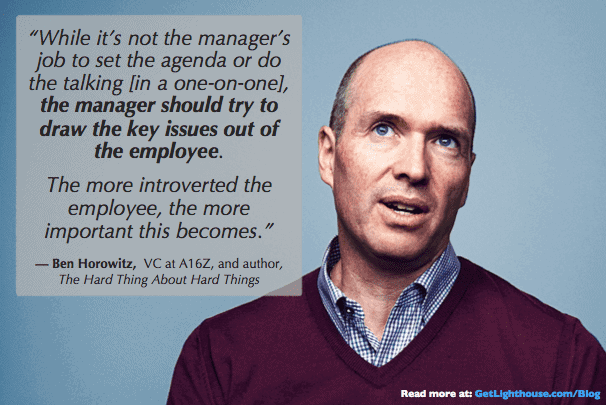
Again, this is where privacy matters. By using these one on one meeting questions, you avoid putting anyone publicly on the spot. You also make it safe for them to be honest about how they feel in a way they'd never be in a group setting.
These one on one meeting questions can help make sure you don't miss anything important to them, and get blindsided by a departure:
- 76) What do you feel is your greatest accomplishment here?
- 77) When was the time you enjoyed working here the most?
- 78) Are you happy with your recent work? Why or why not?
- 79) Are you happy working here?
- 80) Who are you friends with at work? (Shown to be a key to enjoying your job)
- 81) What's something you feel is undervalued that you contribute to the team?
- 82) What part of your job do you wish you didn't have to do?
- 83) What's not fun about working here? What do you enjoy most about working here?
- 84) What worries you? What's on your mind?
- 85) What would make you leave this job for another?
- 86) Is your job what you expected when you accepted it?
These one on one meeting questions are about action, not therapy.
Remember to make this a productive conversation. You are absolutely *not* their therapist.
Your goal is to uncover issues, and work together to address them, or suggest where they can (like a real therapist, if needed).
Knowledge is power. Once you know about a situation or issue affecting your team member, you can address it. They might just have a good reason why they need to leave early some night, or come in late in the morning. Even small accommodations to help them will earn their respect, and pay into your emotional savings account with them.
Worried about low morale on your team? Here are some ideas of things you may be doing to contribute to it and how to fix it.
And here are some 2022 insights for helping your team deal with their issues.

6) One on one meeting questions for Remote Employees
If you're managing remote employees, you face a unique set of challenges. One of the greatest of which is keeping communication clear and healthy.
Unfortunately, because so much of remote employee communication is via text (chat or email), you can't read the non-verbal signals you'd notice in your team members in an office with you.
These non-verbal signals are vital for helping us interpret meaning and intent. The result is that misunderstanding can arise more easily.
But that's not the only issue with communicating remotely. Centuries of survival and tribal conditioning further complicate things.

One on ones help overcome remote communication issues
Former FBI instructor and author of It's Not All About Me: Ten Techniques for Building Quick Rapport With Anyone, Robin Dreeke says that this conditioning has wired us to assume that others hold negative feelings toward us:
"These concepts are genetically coded in each of us (to varying degrees) because of our ancient survival instincts (ego-centrism) as well as our need to belong to groups or a tribe (tribal mentality for survival and resources).”
When this conditioning is combined with a lack of non-verbal signals, our threat meter assumes the worst and conflict can arise. Instead of seeing our team member as a tribe member, we can see the remote person as a threat.
One on ones offer a way to develop clear and healthy communication. And that helps you work through these misunderstandings that might arise with your remote team members. It also builds the rapport necessary to keep those misunderstandings from arising in the future.
What should you talk about in remote one on ones?
Many of the opportunities you have to build rapport with employees in the office don't work for those working remotely.
One on ones are your only significant opportunity to build rapport with remote employees, so you need to make them count. For that reason, one on ones with remote employees should tend to be longer.
For one, give yourself more time for small talk. One on ones are your only time to learn about your remote employees on a personal level, which is important given they tend to have more feelings of loneliness according to Buffer's State of Remote Work report.

Even a few extra minutes at the beginning or end of every call can help you make a personal connection with them. It will help improve your working relationship and build trust over time.
Also, dive into work-related issues and gather as much feedback as possible. They can't just walk into your office when they want to talk about something. This means your 1 on 1s with them are a rare time they can approach you with any issues they might be having and know you're available to discuss them; the more time zone difference you have, the more important that becomes.
Use these one on one meeting questions to help you build rapport with remote employees and identify potential issues to work with them to resolve (and some may be good to ask your in office team members, too!).
- 87) How long have you been working remotely? What were the most challenging and surprising things when you first started?
- 88) What helps you feel connected to others and counteract the potential loneliness of working remotely?
- 89) What do you do to recharge each day?
- 90) What's your setup like for working? Is there anything you feel you're missing?
- 91) Do you feel the company supports remote staff effectively? How could we improve?
- 92) Do you think our decision-making process includes those that work remotely well? Have you seen a decision drag out for too long lately? (Decision making is hard and usually longer in remote teams and is worth constantly monitoring the pulse on.)
- 93) How well do you feel you know your coworkers?
- 94) Do you feel like you have opportunities for "water cooler” type discussions with the team to help you spur on ideas?
- 95) Do you feel you could go to anyone asking them for help?
- 96) What's most challenging for you in your daily work routine?
- 97) What about our team / company do you want to learn more about? (They may not pick up as much missing office chatter)
- 98) How well do you feel you know your coworkers?
- 99) How do you manage distractions during the day? Is it a challenge for you?
- 100) When you have a creative idea or epiphany, what do you do with it? (The kinds of things that would get openly discussed in an office could be missing!)
- 101) How is your work-life balance right now? What would you like to change about it?
- 102) How do you feel your energy levels are at work right now: strong and motivated, okay, or feeling kind of run down or burnt out?
- 103) How have your routines changed since you shifted from office work to working remotely? What's worked better? What do you want to change?
- 104) How often do you take breaks during work? What helps you recharge when you do?
- 105) What routines or habits help you be at your best and work sustainably?
- 106) What's your favorite part about working remote? (Understand what drives them)
[Ed note: Special thanks to Jevin Maltais and Mathias Meyer for their feedback & suggestions on these questions.]

Remote one on ones help you stay connected
Recent research from Dr. Bradford S. Bell, Director of CAHRS at Cornell University, found that remote workers are more at risk of feeling isolated than their in-office colleagues. This can not only impact their happiness, but also their health.
"Remote workers can face a number of personal and professional challenges... And there is the risk that those working outside the office can become socially isolated.”
However, the same study found that those who had regular contact with friends or colleagues showed no negative effects.
One on ones allow you to build rapport and work through issues. They also make your remote employees feel connected and supported.
Investing in better, high-quality one on one meetings for your remote team members has far-reaching, positive effects.
Learn more about how to manage remotely: 5 Things You Didn't Expect When Managing Remote Teams (and what to do about it)and if you're brand new to remote management, avoid these 13 things you didn't plan for when hiring remote employees.
You can also read our take on Buffer's remote work statistics in 2022.

7) One on one meeting questions to lead your team through a crisis
When faced with difficult times, effective communication becomes critical to maintaining a happy team. That means, for one, you should be sticking to your regular 1 on 1s or even having them more often than usual.
Your team will have questions, concerns, misconceptions, and issues they want to talk about. With the right questions, you can dig into each of these areas effectively and help them (and you) come away relieved that you're on the same page and have a clearer understanding of what's going on.
This will help you solidify their trust during a time where trust is otherwise easy to lose.
The problem is, with all the stress and uncertainty, they might not feel like opening up at first. So, you'll often need to guide the conversation where it needs to go to ensure you touch on each of these areas.
Start by opening up the conversation with questions like:
- 107) How are you feeling right now?
- 108) How do you feel about our company's current prospects?
After you've warmed things up a bit, encourage them to talk about what's on their mind:
- 109) What questions do you have about our company right now?
- 110) What can I do to help you feel more confident or comfortable right now?
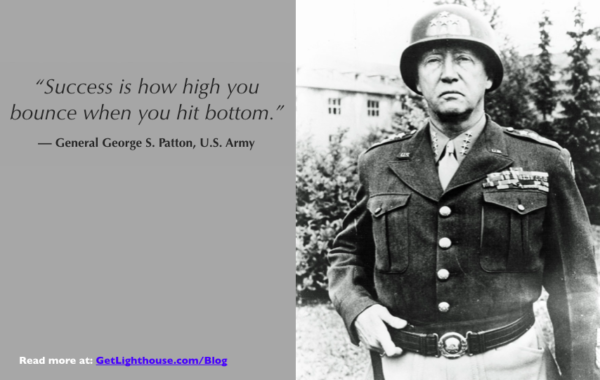
Then refocus on positive things to help pick them up and refocus on what's good about the situation:
- 111) What is your favorite part of your job? Why that?
- 112) When do you feel most productive and motivated when working?
To follow that, remind them of their purpose so they're motivated to do their best at a time you need it most:
- 113) How do you think your work impacts our team and company?
Lastly, make sure you commit to making progress between meetings so you're both clear on what needs to get done:
- 114) What can we both do before we meet again to make progress on what we discussed today?
If you follow this process to get them to open up, get down to any issues they see, and refocus on the best path forward, you'll help your team through difficult times by maintaining the trust you've built while empowering them to take action to help be part of the solution.
Further reading:
- See more great questions you can use to help your team through difficult times in Crisis Leadership: 29 Questions to Ask Your Team to Thrive in Difficult Times.
- To learn more about leading your team through a crisis, read our guide on Leading Happy Teams Through Crisis: 5 Ways to Keep Your Team Happy and Motivated in a Recession.

8) One on one meeting questions for being a great coach to your team
It's not enough anymore just to be a manager. To be a great leader and manager to your team, you also need to be a great coach.
According to Gallup, "Companies are shifting from traditional performance management practices to a new approach that focuses on performance development.”
The old practice of relying on most coaching coming during an annual performance review just doesn't work. According to Gallup's Re-Engineering Performance Management study:
"At the core of the performance management problem is a vivid and distressing picture of employees going to work every day and facing unclear job expectations, little coaching from their manager, unfair accountability practices and a lack of opportunities for development.”
And it's not just what's needed, it's what employees want.
Consulting firm PwC found that opportunities for career progression and developing new skills are key for recruiting Millennials:
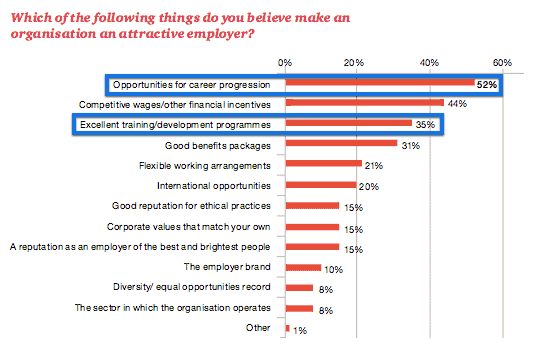
Equally important, during difficult times where layoffs and budget cuts are prominent, coaching is one of the best things you can do to give value to your team and keep retention up without spending more money.
This is especially relevant for senior leaders. As your team grows, you'll need to develop a culture of coaching and development to help your team succeed, and create the leaders you need in your organization. This is especially important because of how much talent promoted from within tends to outperform talent hired in.

Use your regular 1 on 1s to offer coaching
Your regular 1 on 1s are the perfect place to offer coaching. They give you ample time to dig into various topics, offer advice, and clarify anything you're teaching them in a private setting.
The right questions can help you gather the information you need to coach each team member in a way that works best for them.
Use these 1 on 1 meeting questions to help you find out what skills they need and want to work on. They'll also help you discover what drives them so you can motivate them more effectively:
- 115) "What area of your job do you want to work on your confidence?”
- 116) "How do you like to receive feedback? (In 1:1s, as-it-happens, etc.)”
- 117) "How do you prefer to receive recognition? (Public or private)”
- 118) "When do you like to work on developing new skills? Do you have a routine for it?”
- 119) "When do you typically read?”
- 120) "What frustrates you or makes it much harder for you to learn?” (Learn what to avoid.)
- 121) "What's 1 thing you'd like coaching from me on?”
- 122) "Do you ever feel imposter syndrome? When does it happen?”
- 123) "How do you like to receive feedback? (The medium: chat message, email, in person, etc.)”
- 124) "How do you learn best? What medium, format, or approach?”
- 125) "Who was your favorite coach or manager you ever had? What did you like about how they worked with you?”
- 126) "What skills would you like to work on?”
Whether you're an experienced coach, or just starting to develop those skills, learning what your team prefers and needs most will make you more effective. But you won't know if you don't ask.
Further reading:
There's a lot more to being a good coach, and we have a whole bunch more for you to read to help you learn what to do, starting with these posts:
- 12 Questions to Ask Your Team to Become a Better Coach at Work
- Why Today's Managers must Become Coaches (and how you can do it)
- Employee Coaching: Why it matters and how to become great at it
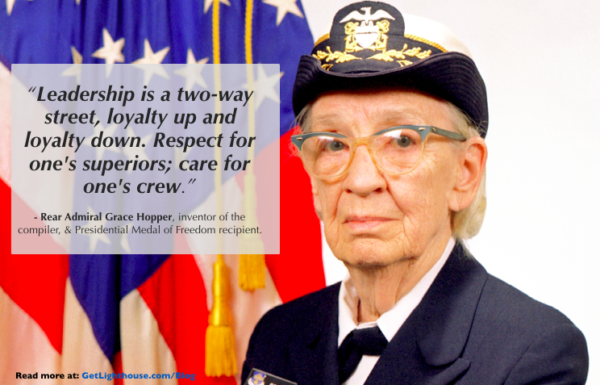
9) One on one meeting questions for senior leaders - skip level questions
As Winston Churchill once said, "The difference between mere management and leadership is communication.” As a senior leader, this is particularly important, but can be increasingly difficult.
When you're removed from the day-to-day, front-line work of the individual contributors in your organization, you miss out on a variety of insights that could improve your company and team.
That's where skip-level meetings come in. Skip level 1 on 1 meetings give you a way of keeping your finger on the pulse of all of your teams and gathering insights that can help you lead more effectively.
You achieve this by meeting a few times per year with team members that report to your direct reports like in the picture below:
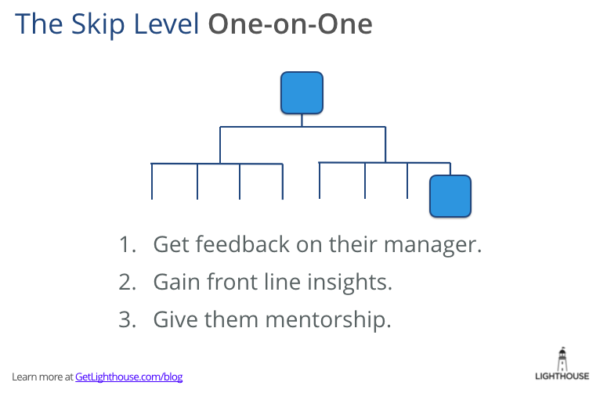
If you've never done skip level meetings before, check out our guide on everything you need to know about skip Level 1 on 1s, including how to start them.
Just like with 1 on 1s, there are questions that are best asked in skip level meetings for virtually all the same categories.
For example, use these skip level meeting questions to help you build rapport and trust with team members who may be intimidated by a senior leader like you:
- 127) Where did you grow up? Where did you go to college?
- 128) What's your favorite part about living in [your city/town/region]?
- 129) What's your favorite book you've read / podcast you've listened to / movie you saw recently?
- 130) What made you decide to become a(n) [engineer/marketer/salesperson/customer success/role]?
- 131) What made you decide to join our company? What were you most excited about when you started?
- 132) If they have children: How is [name of child] doing? (Ask something related to their age like starting school, playing sports, or other interests.)
- 133) Who do you think makes the best (regional food for your area: BBQ, burritos, etc)?
- 134) What drives you? What motivates you to come to work each day?
These skip level questions are then great for obtaining valuable feedback to help you better coach and improve the managers that report to you:
- 135) Are you happy with your career progress here? Why/why not?
- 136) Do you feel your manager is approachable? Why/why not?
- 137) How does your manager handle questions when you ask for help?
- 138) What is a recent situation you feel like your manager did a great job?
- 139) What is a recent situation you wish your manager handled differently?
- 140) If you were in charge of the team you work on, what's one thing you would do differently? Why that?
- 141) Do you feel you're getting enough feedback from your manager? Why/Why not?
- 142) When was the last time you had a conversation with your manager about your career? How did it go?
And, lastly, use these skip level meeting questions to learn about who you should praise and recognize, as well as learn who your stars in your organization are:
- 143) Do you feel we properly recognize people here? Why / why not?
- 144) Who played a critical role in the success of [recent project x]? What did they do?
- 145) What is the greatest strength of your team? Who personifies that best?
- 146) Who do you enjoy working with most on your team? Why them?
- 147) Who is an unsung hero in our company? What do they do that deserves recognition?
- 148) Who on your team makes those around them better? What do they do?
- 149) Has anyone gone well above and beyond lately? What did they do?
- 150) If you were forming a new team, who are the people you'd most want on your team? Why them?
As a senior leader, you can't be everywhere all the time. By having occasional skip level 1 on 1 meetings with your team members further down the org chart from you, you can keep a pulse on how they and the managers they report to are doing.
Further reading:
New to skip level 1 on 1s? Need to improve how you make use of the time? We have you covered:
- You can find 66 Skip Level Meeting Questions to Improve Your Managers and Engage Your Employees for more great skip level questions
- See our complete guide: How should an employee prepare for a skip-level meeting
- Learn how to use your skip level 1 on 1s to improve your managers
- And more on helping your new managers be successful: New Manager? 3 Tips to Help Them Succeed
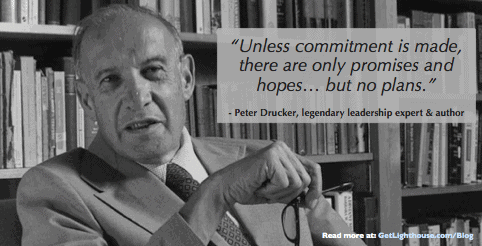
The Last Step: The one on one questions you need to ask *every time*
Who knew there was THIS MUCH you could talk about in a one on one!?!?
All of these one on one meeting questions will help you build stronger relationships with your team members. However, a conversation should only be the start.
What's essential is you then take action.
Action is what leads to change and improvement. It's what starts the flywheel going to make these the mega-valuable meeting they are.
This is why the 2 questions to ask in every one on one meeting are:
- 1) What can you do to take action or make progress on what we talked about today?
- 2) What can I do to take action or make progress on what we talked about today?
By asking these questions, you're working *together* to make things better. It creates a psychological contract between the two of you to both keep your promises.
Then, when you get to your next one on one, you're both likely to see things are just a little better. It also reminds your team member that you really listen, and when they have the courage to bring up issues, it leads to things happening.
That's how you build trust.

If you don't set actionable next steps, you lose everything. These 1 on 1 questions can set things in motion.
Your team will not trust you to continue bringing up issues if nothing happens or changes. Instead, they'll slowly disengage from your one on one meetings with them and give you one-word and non-answers in them.
And you'll suffer, too. If you ask them to do something, but don't make it explicit, they may forget or misinterpret what you said. Then, you'll be frustrated, too, especially if you're trying to improve their performance.
You can avoid all that by being explicit. During the meeting, write down any notes you have and what your steps are for next time.
You'll also tap into the Progress Principle we mentioned earlier.

What you talk about makes all the difference in your one on ones. Use these 1:1 questions to your advantage.
For most newer managers and their teams, these 10 categories of one on one meeting questions are a revelation; suddenly one on ones have a real purpose and value not found any other way.
As one team member whose manager used Lighthouse (which has hundreds of one on one meeting questions available right with your notes) remarked:
- "At my last company, we had one on ones too, but they were constantly re-scheduled and my manager was always rushed. It's only doing them here that I actually understand the value of them.”
Further reading on 1:1s and 1:1 questions:
Looking for more topics to dive into next? Check out these posts from the Lighthouse blog on one on ones, team improvement, remote management, and more:
- Further one on one learning for advanced leaders: Who really owns a 1 on 1 meeting? It's not so simple.
- More great questions specifically to ask your remote employees: 31 Questions to Ask Remote Employees to Better Support Them
- And if you're looking for questions to ask in one on ones with another manager, these 96 Questions to Ask in One on Ones with a Manager can help you.
You can also check out one of the episodes of the Creating High Performing Teams focused on improving your 1:1s.
Are you and your managers wasting their 1 on 1s?
There is no greater investment to make in your team than having 1 on 1s. Yet, done poorly they’re a huge waste of time.
That’s why we made the 1 on 1 Master Class. You and your fellow managers learn step by step how to supercharge these meetings to motivate your teams, fix problems, coach your people, and much more.
You can learn how Lighthouse Lessons can help your leaders like we helped SeedBox Technologies by signing up here.

What are good questions to ask employees in one on one meetings?
There are a variety of great questions to ask your employees depending on what topic you want to cover. For example:
- Building rapport: "How are you? How is life outside of work?”
- Career development: "What work are you doing here that you feel is most in line with your long-term goals?”
- Receiving feedback: "How can I better support you?”
Learn hundreds of great one on one meeting questions by checking out the full guide here.
How do you conduct an effective 1 on 1 meeting?
Here are 5 tips for having effective 1 on 1 meetings:
- Schedule a recurring time you both can stick to
- Have an agenda to guide the meeting
- Build rapport with your team member
- Ask great 1 on 1 meeting questions covering topics like growth, feedback, and new ideas
- Don't leave without agreeing on action items to complete before the next meeting
For more on how to have an effective 1 on 1 meeting, check out our 1:1 meeting template for managers.
What do you talk about in a 1 on 1?
One on one meetings are the perfect opportunity to dive deep into things you typically wouldn't get the chance to talk about with your team member. They help you have the most effective, productive, and motivating working relationship you can have with your team members.
You can talk about many things in your one on one meetings, including:
- Rapport: Their life, family, hobbies, and interests
- Feedback: What do they think about the team? About you? The company? What feedback do you have for them?
- Coaching: Where do they want to go in their career, and with the company? Do they have an interest in leadership?
- Challenges: Is something holding back their productivity or causing them stress in or outside the workplace and inhibiting their ability to work?
- Anything else relevant to their success and happiness at the company




